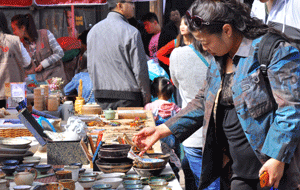Extra efforts needed to save more food
Updated: 2014-12-04 07:46
By Shenggen Fan(China Daily USA)
|
||||||||
Food loss and waste occur in every country. While the exact amount of food loss and waste in China is unknown, a study shows that roughly 19 percent of grains produced in the country is lost or wasted. For perishable foods such as vegetables and fruits, the percentage of loss and waste could be even higher. Annually, about $32 billion worth of food, which could feed 200 million people a year is lost, according to China's State Administration of Grain.
Besides, half of the 72.5 million tons of food China imported from January to October was lost because of poor storage and transportation methods. Food losses and waste incur high economic costs due to spoilage and inefficient use of resources, while contributing to hunger and malnutrition.
Such waste and loss of food are especially disturbing because China still has 150 million hungry people to feed. Child undernutrition is still a big challenge for China, nearly 10 percent of the country's children are stunted (a bellwether of undernutrition that results in debilitated physical and cognitive growth).
Food loss and waste put pressure on the country's agriculture system that has to feed 21 percent of the world's population with only 6 percent of its freshwater and 9 percent of arable land, according to the Food and Agriculture Organization of the United Nations. In China, agriculture is often the most intensive user of scarce resources and a main contributor to greenhouse gas (GHG) emissions. For example, agriculture is responsible for about 70 percent of China's water use, and under a business-as - usual trajectory, the country could face a 25 percent water supply gap by 2030. And accounting for 20 percent of the country's total GHG emissions, China's agriculture sector emits more GHGs than any other agriculture system in the world.
So, how can China reduce food loss and waste? Through a comprehensive approach. The "Clean Your Plate" campaign, which encourages Chinese people to save food in order to reduce wastage of food, is laudable. But more needs to be done.
In China, more food is lost in the processing and storage stages than at the retail or consumption level. China can tackle the challenge of food loss and waste by investing in food-preservation technologies and infrastructure, changing policies and promoting greater consumer knowledge about food wastage. Moreover, increased investment in production technology, infrastructure and post-harvest handling should reduce post-harvest losses.
China loses 27.5 million tons of food a year because of poor storage and transportation. Major grain producing regions lack sufficient storage infrastructure, which not only exacerbates food losses, but limits farmers' incomes. The use of cold storage facilities in India and Bangladesh, for example, has increased potato prices for farmers during the off-season and reduced food losses.
Policies to promote the right prices of foods and natural resources that reflect the true cost to the environment and climate are an important step toward encouraging sustainable production and consumption practices. For a more efficient food system in China, subsidies that promote overuse of natural resources and increase carbon emissions should be phased out. Savings from the elimination of such subsidies should be re-prioritized toward high-return investments - production of more nutrient crops such as fruits and vegetables and enhancement of the whole supply chain to minimize losses and wastes.
The removal of such subsidies, however, may cause food prices to increase with negative implications for poor producers and consumers. In such situations, strong social safety nets must be put in place to protect the poor.
As for food waste, it is important to continue to educate consumers on good consumption habits through campaigns such as "Clean Your Plate". Changing behaviors and culture regarding food waste at the dining table, particularly in restaurants, is important. But more importantly, consumers should be made aware of the best practices in safe food storage, package dating, and household as well as societal benefits of reducing food waste. And retailers should be discouraged from wasting food by following unnecessary standards for the color, shape and size of fruits and vegetables.
The author is director general of the International Food Policy Research Institute.
(China Daily USA 12/04/2014 page12)

 Last artistic flourish in neighborhood to be demolished
Last artistic flourish in neighborhood to be demolished
 Parents 'see' through the eyes of their child
Parents 'see' through the eyes of their child
 Carpenter carves armored vehicle from wood
Carpenter carves armored vehicle from wood
 Reclusive old men in the Qinling Mountains
Reclusive old men in the Qinling Mountains
 Greetings from Tibet
Greetings from Tibet
 A buck to the Year of the Goat
A buck to the Year of the Goat
 China-US Internet Forum in DC
China-US Internet Forum in DC
 Shanghai native creates mini car by hand
Shanghai native creates mini car by hand
Most Viewed
Editor's Picks

|

|

|

|

|

|
Today's Top News
US startup a good fit for China electronics player
93% of Chinese govt websites have security loopholes: report
2014 likely to be warmest year
Blending of cultures benefits world
Mutual governance of cyberspace called for
Founders of HK protest lead dozens to surrender
Firstmove by rail giants puts merger on track
China has glitter for dealer of diamonds
US Weekly

|

|







